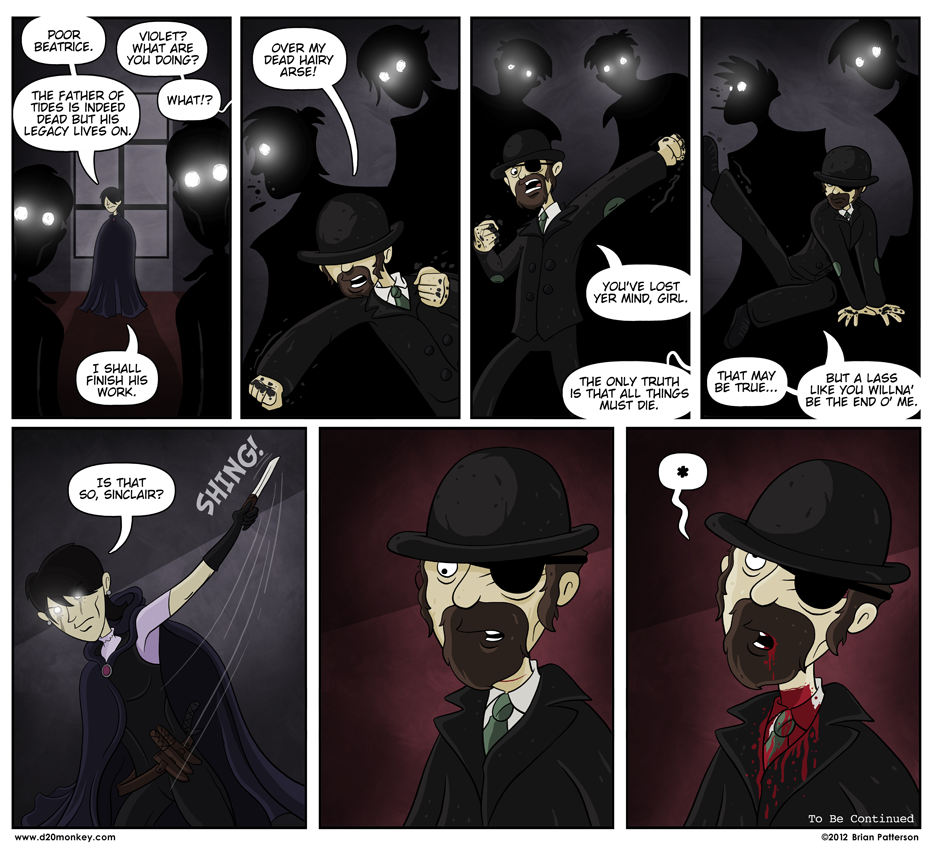Innsmouth Garden Society: Part Eight
Chapter: Season Three
Characters: Caldwell Sinclair - PC, Violet Clyne - PC
Oh no she didn’t!
This week I am all over the place with guest comics! Several folks are making trips to conventions as the season for such things is here and since I am only lined up for a few appearances this year (so far), I am doing my part to help these nice folks out.
First, I did a comic for Javis Ray’s great comic, Legacy Control over here and then I stepped in the help out Joel Watson with another Hijinks Ensue guest comic here. Do me a favor and check both out (and leave a kind word if it strikes you). Javis and Joel produce great comics and I am honored to step in for a day.
COMMENTERS: Have you experienced the sting of player betrayal during a campaign? If so, were you betrayed or were you the betrayer?











Ah, good old Cthulhu. If you don’t die, you go insane. If you don’t go insane, you die. Or both. Yay!
Just last weekend, in fact. One of our party was secretly working against us the whole time. This finally came to light in game, and we were ready for a royal smackdown… He kicked our asses, and left us for dead. Yeah, that was a real morale booster. -_-
Best game I ever had was one where during the night my character have been replaced with a doppelganger, I got to play with the party for about three more sessions before it came to light, but only after the party killed the real me thinking it was a double…it was awesome.
In my last d&d campaign the cleric secretly betrayed the group pledging is loyality to the enemy god. When they finally discovered him they had a huge figth, he managed to flee with an important artifact and became one of the best villain in the campaign (the player changed character at that point and i started using the cleric as an npc); the whole group had a lot of fun.
The group was a large one and we had all definitely covered the “typical” D&D roles; I was the wizard, a role I relish. He was all brain and no body, with a natural 18 intelligence and wisdom and charisma above fifteen, but his strength was a six, his dex a 10, and his con an 11. To make matters worse, he had a flaw: Crippled, which halved his movement rate. Yet, he survived encounter after encounter, including getting lost in the world of the fey for 24 years, aging significantly before he managed to come back out to his friends. The real world had only lost six hours during his absense.
Anyway, we had a rogue in our party named Serephin and she turned out to be a traitor in the end. She and my character never really got on as she tended to use her body as leverage in dealings and would cheat the group. Thaddeus, on the other hand, was a respected mage with refined tastes and strong moral character (boring I suppose you might say).
The climax of our game would come after the betrayal; at a wedding Thaddeus was poisoned by Serephina and, since his strength had dropped to 1 and he was paralyzed, she did the evil villain monologue about his being some key to some prophesy and her master would be pleased that he had been removed. She left a knife quivering in his chest as she left, but when she returned to take items off the body, the body was gone. It was an interesting campaign.
In the campaign I run, we had a series of sessions with them playing as characters that had been introduced as NPCs. Despite the warnings this should throw up, they were still surprised when one of them had been replaced with a body stealing skeleton, and it ended up with him killing one of the others, which will have a bad effect on their main characters in the long run. The looks on their faces were priceless, especially the one who got to play the betrayer!
In Cthulhu, so far no. We had a moment where we feared that a PC was possessed, but he got better.
In other games, oh yes. Shadowrun, 7th Sea, Vampire, you name it. So far it hasn’t led to any players killing each other, but a GM willing to run that type of game should keep in mind that it’s a very real possiblity. And that a GM’s screen has no real-life stopping power when used as a shield against thrown died, softdrink cans or LARP weapons.
Dice, of course, not died.
I had an interesting game of Tunnels and Trolls about a month ago where, I am happy to say, I was the betrayer. I played a Dwarf Fighter (typical I know), I rolled AMAZINGLY and was stronger than the whole party, the people we were working for hated Dwarves and I wanted to help my people, so I went along with the plan to gain entrance to a forbidden area to enlist the help of some, lets say questionable characters, after that the shit hit the fan. I was inciting a rebellion, another player went along with me out of fear and the others were trying to stop me. We all died.
My favorite ‘betrayal’ was in a game of Cyberpunk where my cyber doc installed cortex bombs in the group members that he helped ‘upgrade’. I mean, if you were running around with a bunch of cybered up gun toating psychos, wouldn’t you want some insurance?
Only had to detonate one of them…
Betrayal (sort of):
My group was starting a new 4e campaign. I was super-excited about my new psion – I was really into his character, and he had taken a special Dragon magazine option to be able to delve deeply into the minds of those he damages with attacks to their Will defense.
On our first adventure, our low-level party was struggling against a bunch of swarms. Our melee striker was surrounded by them, and getting ripped apart. I decided my Unaligned, dickish psion would drop an At-Will burst on said striker, in order to do some good damage to the adjacent swarms. So what if it was an “all creatures in burst” attack – it was only 1d6+modifier damage – the worst I could do was knock him unconscious, right? The swarms were going to do that anyway. There’s a good chance I would save his life.
And then I critted on the guy. I hit some of them, too, bloodying one or two. But I then rolled my magical item’s crit damage. Maxed it. And it turns out his health had been very low. Now the character was dead.
I stared at the board, as they pulled the mini off. I had killed my first PC. But I hadn’t done so as a GM, but as a fellow player.
And then another PC, a druid stuck in dog/wolf form, who had befriended the dead character in previous adventuring, came up behind me and bit me in the ass, for my surge value. And suddenly my squishy controller was having to fight on two fronts, one against a now former ally, one against a winning group of monsters. My character and I were rather worried.
And I had killed a friend’s character. I felt like shit. But it wasn’t over: Was I going to kill another friend’s character, or be killed? What would my dickish, but shocked-at-slaying-a-fellow-party-member, character do?
In a Vampire campaign, when I was playing a conflicted Follower of Set, one of my characters old childer came into the picture and proceeded to turn me against my best friend with Love and Rage, inciting a full on duel between us. The Assamite pretty much cleaned the floor with me before the ST interceded. He was shocked that friends IRL could go toe to toe with every murderous intent so readily. Sadly, the FoS could have won the fight, but the player was suffering from “too many powers” forgetfulness.
Well, I’ve been the Computer in Paranoia games. I think my players understood well why the game is named so.
When A player betrayal is written in and done well as a part of the story, it can be fun. Sadly though the player betrayal’ I’ve experienced have not been so amusing.
I used to have a DM that when he got bored with the current campaign he’d bring in older powerful characters to kill those of us who weren’t key to the his world.
Usually the munchkins are so powerful that you cannot run, you cannot fight, and they usually kill before anyone can get an action. I guess that is why I have a particular distaste for WoD system. But I should hate the player not the game I guess.
So far I had been skinned alive (more or less considering I was undead), Eaten for my powers, been killed because they thought I would betray the party, Turned to a vampire against my will, Blood bound (incorrectly) for the Game Master’s amusement so we were forced to go on missions, and this doesn’t even begin to cover the dozens of characters I have out thought and backstory in to only be played for one game before the Game master didn’t want to play that current campaign anymore.
Calm… calm… this is not the place for my rage… calm Kinse, calm
Years ago, and I was both. I was betrayed by my GM’s forgetfulness in that the attack that controlled my character should not have worked – human pheromones should not have affected my character’s alien physiology – and I was the betrayer in that I was emotion-controlled and turned against the party. I managed to cut one armored hero in half before I was subdued. For the record, the GM did not take over running my character – even though I disagreed, I played it to the hilt.
A few years back i was involved in a D6 Fantasy game, my character was a shady character, a traitor to his own family who had begun to travel with a group as a mercenary, He connected with the Dwarf Fighter as brother almost. Well as the groups cause became more and more self righteous, their cause, a war against a tyrannical monarchy that ruled the majority of the continent, it appealed to him less and less, keeping him from leaving was a bounty out on the group. During the final confrontation with the Queen He is offered an out and a well paying job in their ranks, he takes it and ends up in a solo fight against the Dwarf Fighter. After a very long battle, i swear the die were against us that night, I finally lost the fight. The Queen Escaped, and later my character returned as a death knight of sorts, over all a very interesting campaign.
another quality comic… i wish i had some more friends interested in D&D since i have never experienced a actual rpg like the stories told here in the comments but it does sound incredibly awesome. going to have to try and find a group to test it with lol.
The betrayer 😀 I didnt kill any of my team but I did steal a crap ton of money, gems, potions and other things from them. Hey thats there own fault though. When the DM asked for one of us to keep track of all the loot we got in fights they probably shouldnt have looked at me, the rogue, and said “Hey Tim has paper he can do it.” Right then he said “ok you found 50 gold” “alright 20 gold.” “no no 50” “yeah thats what i said 20…” evil grin >:D Kudos to them though for not metagaming the fact that I was taking loot for myself even though they almost caught me several times… almost lol.
I more or less have been in the betrayed party in two or three games where I wasn’t the DM. And I’ve done it once or twice as a DM.
Once it was horribly done, where the DM ruthlessly took over the PC and made him slay our only magic user. That left us unable to injure or hurt the villain, who then slew the entire party before we could flee. And the DM said, “Well that’s it. This campaign is over.” Which caused a coup, because the players had been investing 6 hours a week in playing this game for two months.
The other time, I approached a player with an incentative. The PC had a subplot attached to him that involved loved ones. The villain had learned of them and kidnapped them, coercing the PC to help him in certain situations. It wasn’t an obvious betrayal in that the player had to slay someone else’s character, but more like, “Oops, I dropped the artifact,” or, “The rope broke! (having pre-cut it, letting the dwarf go last and fall to break his ankle)” It went on for a few months, and he wasn’t always doing something for the main villain – there were sessions where he wasn’t contacted at all. Eventually, though, in the climax, he was given the choice in front of the other PCs to ditch them in the heat of battle and save his family, or stay to save the nation and lose his family. The rest of the PCs were stunned and didn’t know what to tell him. They weren’t mad at him when he did stand aside with his family, not assisting.
The best part? When the villain was down on his knees begging for forgiveness, the blackmailed PC found a way to poison him. He then blackmailed the villain as revenge for awhile in the campaign with the antidote. It was a great campaign.
Let’s just say that I don’t play tabletop or live-action Vampire: The Masquerade games with my brother-in-law any more. You can pretty much predict his character’s going to turn on the party in every campaign, you just never know when, and pre-emptive strikes are frowned on by the story teller (his wife, my sister).
There is nothing more disheartening.
Than reading through a webcomic archive.
And realizing the next button has stopped working.
Because you’re caught up.
Little late down the road for this thread, but I liked it, so… there. I was the betrayer. It was old 2 ed., and I was playing a CN thief (yes, that’s what rogues were called back then) whose entire line of thought involved getting loot. Anyways, the DM kept complaining that we were hack-n-slashing, and not really roleplaying (“Seriously guys, I thought you were better players than this,” were his exact words at the beginning of the fateful gaming session; challenge: accepted). Anyway, the party (only three of us) had just had an argument about what to do with a very powerful artifact, an amulet, that we had just found. We couldn’t use it, but it could be sacrificed in a complicated and dangerous ritual that would possibly prevent future evil from maybe happening. Or, and this was my character’s favorite option, we could sell it for an exorbitant amount of cash and favors to the local uber-necromancer. My character was voted down, and it was decided that the paladin would carry the amulet. In fact, during the argument, the DM passed me a note that said, basically, that he was glad that I was stating my case, and couldn’t I take it just a little further? Well, I did, but I waited. When the spell caster was busy fighting a water elemental (we were crossing a lake on a boat), and the paladin had gotten knocked into the lake by a rogue wave, I reached over to “help” him back into the boat, but instead coup de gras-ed his ass and took the amulet. When the caster was right in the middle of finishing off the elemental, I back stabbed (that’s what it was called back then, but modern players would recognize it as sneak attack) him into oblivion. I waited till right as his spell concluded, though, so I didn’t have to deal with the elemental. End of campaign. The DM was pissed, but my fellow players high-fived me for roleplaying well, and making the DM eat his words.
You want player-character betrayals? Just play Wraith: The Oblivion. Once any PC’s Willpower turns to crap for whatever reason, his or her Shadow (which is basically the dark side of one’s personality given its own sentience at the moment of death) gets to roll a check to see if it takes control of the wraith. If the Shadow aces the check, your wraith slips into Catharsis and suddenly goes all Darth Vader on anyone who’s standing too close, which is usually the rest of the party. Catharsis happens all the time, too. ALL. THE. DAMNED. TIME.
To make matters worse, Wraith is rigged for player-on-player antagonism from the get-go. You have to play TWO characters: Your own wraith and another player’s wraith’s Shadow. Shadows can help their wraiths out now and then, but there are always strings attached…makes sense, seeing as the Shadow’s ultimate reason for existence is to completely wreck your afterlife. So you’re playing another player’s Shadow, and another player’s playing YOUR Shadow…it can get ugly. You just have to remember that your fellow gamers don’t REALLY hate your guts. That’s just how Wraith is. If you’re a masochist who thrives on strife, conflict and betrayal, then Wraith is definitely your bag. 🙂